Streak
Busters Archive - II
This
feature discusses a game in which a winning or losing or bowl streak
ended.
|
October 31, 1959: Oklahoma @ Nebraska
As Bill Jennings prepared his 2-4 Nebraska Cornhuskers to face Bud Wilkinson's powerful Oklahoma Sooners in 1959, he had five strong motivations to spring the upset.
- Oklahoma had beaten Nebraska 16 straight times. The last Cornhusker victory had been 7-0 in Norman in 1942, five years before Wilkinson took the helm at OU.
- Wilkinson had never lost a conference game as the Sooners had escaped defeat 74 straight times in Big Eight contests dating back to a 16-13 loss at Kansas in 1946, the only year that Jim Tatum coached in Norman.
- Jennings, a Norman native and OU grad, had been an assistant under Wilkinson and Bud's top recruiter. However, after he took the NU job in 1957, Jennings was reputed to be the person who alerted the NCAA about questionable recruiting practices at OU. The result was that the Sooners were placed on probation. So there was no love lost between Jennings and his former boss.
- The fact that OU had won the first two meetings in his tenure by a combined 72-14 only stoked the fire in Jennings' belly to beat the hated Sooners.
- Jennings needed a signature win to jump start his program after going 1-9 in 1957 and 3-7 in 1958.
Despite the Sooners being 14 to 17-point favorites, there was reason to believe that this OU team was beatable – they had already lost two games out of the first five after not losing more than one in any season since 1951. The crowd of 34,000 that gathered for homecoming at Memorial Stadium hoped to see the biggest win in school history since Notre Dame in 1925.
- Surprising NU with an unbalanced line, the Sooners took the kickoff and marched 72y in seven plays. RB Prentice Gautt, Oklahoma's first African-American player, scored from the 3 for a 7-0 lead with 12:10 left in Q1.
- Nebraska scored in Q2 on a 42y march. On 4th and goal from the three, QB Harry Tolly rifled a pass to E Dick "Wahoo" McDaniel in the end zone. Pulling out all stops, the Huskers tried to pass for two from extra point formation but misfired to leave OU in front 7-6.
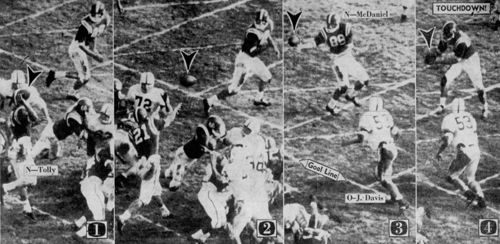
Harry Tolly hits Dick McDaniel for Nebraska's first touchdown.
- Later in the second period, an OU quick kick from its 30 backfired on the Sooners. With a rusher coming right at him, QB Bob Cornell almost missed the ball, which skittered off the side of his foot, took several crazy bounces, and ended up in the hands of NU G LeRoy Zentic who ran unmolested into the end zone to make it 12-7 with 8:05 to go in the half. Backup QB Ron Meade's PAT kick went wide. However, he would make amends later.
- OU abandoned its surprise formations for its standard split-T to drive 56y and reclaim the lead on Cornell's 6y dash. The PAT made it 14-12 at the half.
- The only scoring in Q3 was a 22y field goal by Meade to put Nebraska back in front 15-14.
- On the first play of Q4 from his own 27, the Sooners' Wahoo McDaniel quick-kicked to Nebraska. When the Huskers couldn't move the ball, Tolly boomed a 48-yarder to the Sooner four. Two plays later, McDaniel quick-kicked out of the end zone. Little Pat Fischer ran back, gathered up the ball at the Husker 36, and set sail downfield. He was finally tackled at the three, for a net of -1 for OU on the boot. Three runs gained 1y each to give the home team an improbable 22-14 advantage after Meade's PAT.
- Several plays later, Nebraska recovered a fumble at the Sooner 43. Sensing an upset in the making, the crowd got to its feet and remained there for the remaining 8:50. Fischer's 11y run and a personal foul penalty put the ball on the 16. After gaining only one more yard in three plays, NU trotted out Meade to kick a field goal into the wind. As today's announcers would say, it was a "two-possession game" with 7:20 to play.
- Their backs to the wall, Oklahoma finally started playing like the heavy favorite. Gautt and QB Bobby Boyd led a 67y drive to make it 25-20 with 4:10 on the clock. For some reason, Wilkinson didn't go for two but instead kicked the PAT.
- The Sooner defense forced a three-and-out to put the offense back in business at their 42. Mixing the pass with the run, Boyd moved to a first down at the NU 30 with 1:13 left. Two incomplete passes moved the clock to 0:35. Boyd then passed into the end zone only to have none other than Ron Meade intercept. Meade had to stay in the game after his field goal because of the substitution rules in effect at the time.
Afterwards, Wilkinson was philosophical about his first Big 8 loss. "You win some, you lose some. ... Nebraska was a very fine football team ... I thought it [the upset] might happen before the game, honestly I did."
Nebraska defeated Oklahoma again the next season, 17-14 at Norman. However, after five straight losing seasons, Jennings was gone after the 21-14 loss to OU in the 1961 finale. His replacement, Bob Devaney, started Nebraska on a remarkable 40-year period of football excellence.
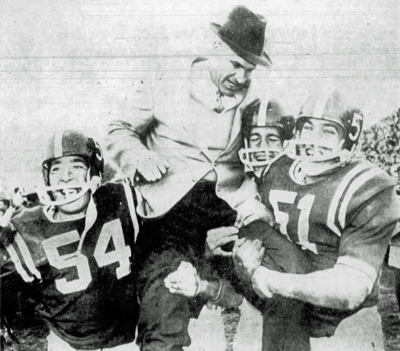
Jubilant Cornhuskers give Coach Jennings a victory ride.
|
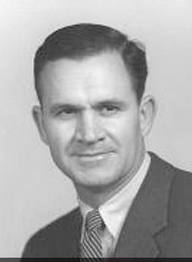 Bill Jennings
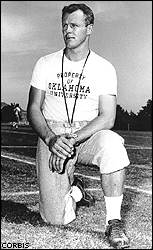
Bud Wilkinson
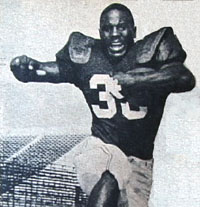
Prentice Gautt
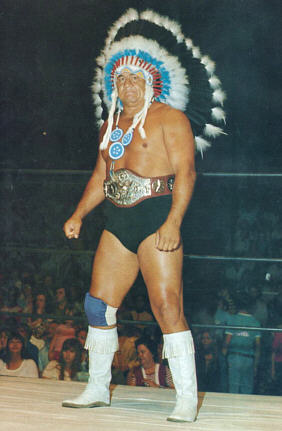
Wahoo McDaniel, OU's Native American LB/FB and later pro wrestler.
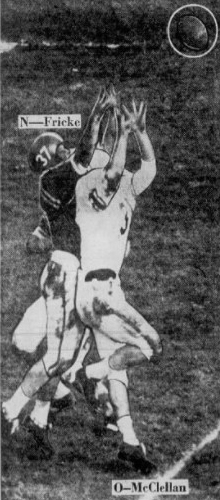
Nebraska's Fricke outjumps McClellan for the pass.
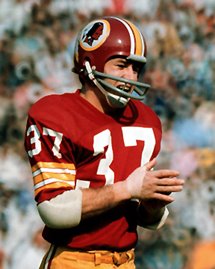 Pat Fischer of Nebraska and the Washington Redskins |
|
December 18, 1977: Chicago Bears @ New York Giants
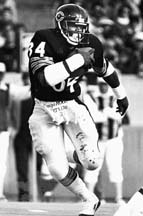
Walter Payton
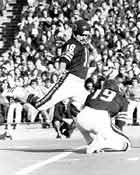
Bob Thomas
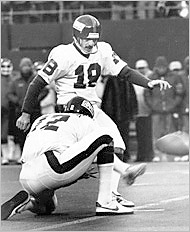
Joe Danelo
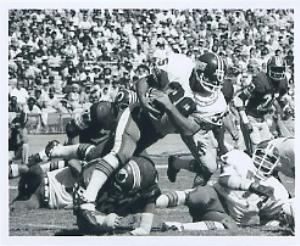
Larry Csonka
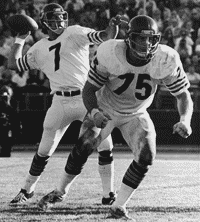
Bob Avellini
|
Now that the last game has been played at Giants Stadium in the Meadowlands, it's good to look back at an interesting game from the stadium's first year.
- Jack Pardee's 8-5 Bears came to the Meadowlands needing a sixth-straight win to clinch a wild card spot and make the playoffs for the first time since they defeated the Giants in the 1963 NFL Championship Game.
- With a 5-8 mark, John McVay's Giants were playing for pride in the last season in which the NFL played 14 games.>
- A subplot involved Bears RB Walter Payton, who needed 199 yd to surpass O. J. Simpson's four-year old season record of 2,003. Four week earlier, Payton had exploded for 275 yd against Minnesota to set a new NFL single-game mark.
The weather was typical for December in the inaptly named "Meadowlands.">
- The artificial turf was covered with ice, sleet, and snow.>
- Icy rain and snow fell during the contest.
The miserable conditions would seem a recipe for a lackluster effort by the Giants, but such was not the case.
- The Bears started the game wearing rubberized turf shoes but dispatched an assistant trainer to buy a supply of steeltipped cleats. That brought to mind the 1934 title game, at the Polo Grounds when the Giants changed to basketball sneakers at halftime and came from behind to defeat Chicago 30-13. This time, the switch helped the Bears.
- K Bob Thomas. who had kicked the clinching FG for Notre Dame over Alabama in the 1973 Sugar Bowl, put the Bears on the board with a 32-yd FG. His New York counterpart, Joe Danelo, tied the score with a 38-yarder. Late in the period, Thomas hit the upright on a point-blank 23-yarder.
- Q2 didn't change the scoreboard.
Chicago made adjustments at halftime. "We changed our shoes and started to go inside instead of outside," said Payton.
- After being held to -5 yards in the first half, Payton finished with 47. While that left him far short of Simpson's record, Walter won the NFL rushing crown with 1,852.
- Q3 came and went with the teams still deadlocked 3-3.
- Early in the final quarter, Danelo broke the tie with a 19-yarder following a 16-play drive in which former Dolphin star FB Larry Csonka carried 11 times for 50 yards.
- The visitors finally mounted a touchdown drive, with Robin Earl carrying it over from the 4 with just under 9 minutes left. However, Thomas's extra point was batted down.
- The Giants marched in the final minutes to send the game into OT. Passes of 14 yd from Joe Pisarcik to Jimmy Robinson and 16 to Ed Marshall spiced the drive which carried to the 10 before Danelo's FG climaxed it.>
Since a tie would knock the Bears out of the playoffs, they were not happy that Thomas had missed an easy FG and had a PAT blocked. The OT would increase their ire.
- In the first minutes of OT, S Doug Plank, Thomas's roommate on the road, intercepted a Pisarcik pass. But Thomas missed wide left from the 36.
- So the torture continued. On a later possession, QB Bob Avellini hit Bo Rather on a 35-yard pass to move the Bears into FG range again. However, C Dan Neal's low snap
kept Thomas from trying a 27-yarder with 2:59 remaining in overtime. A tie seemed inevitable.
- But the Bears got the ball back for a last-ditch effort. Avellini, working frantically in the bitter cold and rain, completed passes of 19 yd to Greg Latta and 15 to Payton to set up a do-or-die FG.
- Before Thomas took the field, LB Don Rives grabbed him near his throat and said, "Don't miss this or don't come back." Plank, who was nearby, said afterwards, "He wasn't laughing; it wasn't a joke."
- When Thomas reached the huddle, TE Bob Parsons picked him up by the shoulder pads and threatened, "If you don't make this kick, I'll break your neck."
- Suitably motivated, Bob booted the pigskin through the uprights with 0:09 left to end Chicago's 14-year playoff drought as well as Washington's hopes for the berth.
Video of the last minute of the game
Highlights of the game are shown at the 6:00 mark of the video.
After all that effort, Chicago's stay in the playoffs was brief. The day after Christmas, the Bears lost to the Cowboys 9-6.
Thomas went on to become Chief Justice of the Illinois Supreme Court after earning his law degree at Loyola University of Chicago.
Reference: "For '77 Bears, Giants Stadium Was a Special Place," Joe Lapointe, New York Times, 12/27/09
|
October 18, 1930: Tennessee @ Alabama
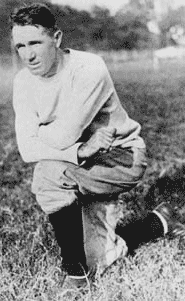
Wallace Wade
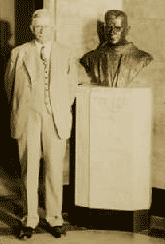
Dr. George Denny next to a bust of himself
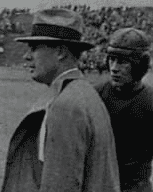
Robert Neyland
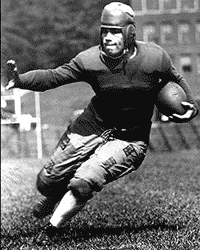
Gene McEver
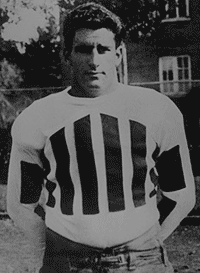
Fred Sington
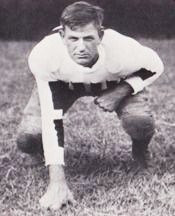
C. B. Clement
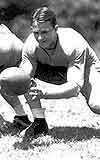
Bobby Dodd
|
Following two straight Rose Bowl appearances, it appeared that Wallace Wade had built a football dynasty at Alabama. In four years in Tuscaloosa, he had compiled an incredible record of 34-3-2. That made the Crimson Tide fans, including school president Dr. George Denny, expect glorious seasons every year.
- In 1927, Bama slumped to 5-4-1 with two of the victories against lightly-regarded Millsaps and Southern Presbyterian.
- The following season was not much better: 6-3 albeit with no weak sisters on the schedule.
- 1929 brought the identical 6-3 mark, including the second straight loss to the team that was quickly becoming the Tide's archrival – Robert Neyland's Tennessee Volunteers.
The second guessing didn't sit well with Wade.
- "He didn't like criticism too much," said a former player, Hoyt Winslett, years later.
- So in the spring of 1930, the coach told Denny he would resign when his five-year contract expired at the end of the upcoming football season to become coach and athletic director at Duke.
No public announcement was made at the time, but the players heard rumors throughout the summer. Finally, they received official word just days before their season opener. Wade used his departure as motivation.
- John Henry Suther, senior halfback for the Crimson Tide, recalled: "He called a team meeting before our first game and gave the most emotional talk I've ever heard. 'Gentlemen,' Coach Wade said, 'I'm gonna win this damn Southern Intercollegiate Conference championship this season, and if you want to be a part of it, you can. If not, get out of here now and never step foot on this ground again.'"
- The Tide responded by winning their first three games – over Samford, Ole Miss, and U. T. Chattanooga – by a combined 132-0.
- That brought them face-to-face with the Vols, themselves sporting three straight shutout victories to start the season, including a 27-0 win over Ole Miss, whom Wade's boys had clobbered 64-0.
- Since he took over the team in 1926, Neyland had tasted defeat only once – in the second-to-last game of the 1926 season, a 20-3 loss at Vanderbilt. Since then, 33 straight without a loss, although three ties were included.
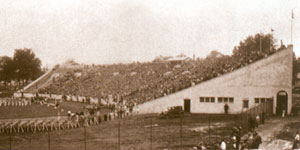 Denny Stadium 1929 Denny Stadium 1929
20,000 fans who gathered in two-year old Denny Stadium for Homecoming and the celebration of the 100th anniversary of the University of Alabama watched the home team dominate.
- From the United Press article:
Major injuries, coupled with Alabama's potent line and slashing
attack was too much for the men
of Major Neyland, who sorely missed
Gene McEver, national high point scorer of 1929.
- The Vol star had suffered a knee injury in the previous game that hampered him into the 1931 season as well.
- Wade evoked widespread booing when he started his second string, the Shock Troopers, who played the entire first period. Suther:
If you want to know the truth, I was booing with them. I'd been a part of two losses to Tennessee. That was my last chance to get even. I wanted to play.
- The crafty coach wanted to wear the opponent down in the first quarter, then go after them in the second period. His plan worked to a T (although no one used that formation yet).
- The highlight of the scoreless first quarter was a UT drive that died for lack of a first on the nine.
- Bama's first team broke loose in the second quarter for two scores. FB John Cain culminated an 80y drive with a 16y run. Most of the gains were over "the elephantine tackles" Fred Sington and C. B. "Foots" Clement. Later Suther broke away for a 30y touchdown. Both PAT kicks went wide.
- A Vol fumble set up the Tide's third quarter touchdown. Ty Disney bobbled a punt as he was tackled at the 12, where Albert Elmore recovered. Using an unbalanced line, Wade's crew smashed over in seven runs with QB John Campbell doing the honors early in the final period.
- Trailing 18-0, the visitors salvaged some pride with a late touchdown. QB Bobby Dodd, later a Hall of Fame coach at Georgia Tech, tossed a 30y pass that was ruled complete because of interference. Dodd then threw a 24-yarder on a trick play to Buddy Hackman to the 17. Next, Bobby threw a pass that bounced off Suther's hands to Disney to put the ball on the 2. It took three tries but Hack finally pushed into the end zone. Dodd's kick was rushed and went wide to make the final score 18-6.
- Bama outgained the Vols 308-212 with 17 first downs to 11 for UT, which threw 19 passes, a large total for that era.
Alabama made Wade's final season memorable by sweeping all 10 regular season games to earn the school's third trip to the Rose Bowl, where they trounced Washington State 24-0 to win acclaim as the national champions.
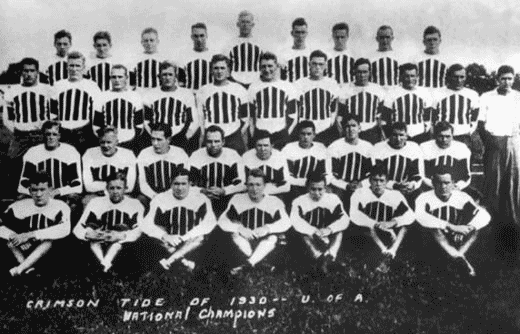 |
|
|
CONTENTS
1959: Oklahoma-Nebraska
1977: Bears-Giants
1930: Alabama-Tennessee
Streak Busters Archive - I
Golden Football Magazine |
